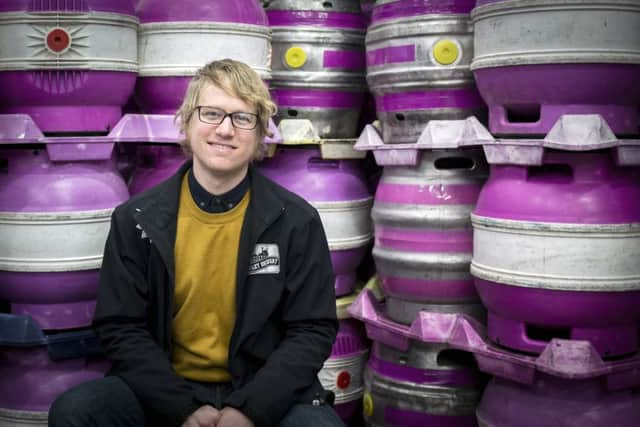Roll out the craft barrel


But for the past decade or so a quiet revolution has been taking place throughout the region, which has seen an explosion of microbreweries serving what has become known as craft beer.
Defining what craft beer actually is has spawned much fevered debate, but one thing everyone agrees on is that it is hand-crafted beer brewed by local independent breweries.
Advertisement
Hide AdAdvertisement
Hide AdIt can be lager, porter, stout or traditional ale but the one thing that unites the tight-knit sector is a commitment to excellence and a rejection of any practices that could resemble mass production.
Craft beer often involves unusual flavours, a focus on creating a wine-like experience wherein the aroma, colouring and even the packaging and naming are equally important as the taste. It can be delivered in draft kegs, bottles, even old-school 330ml cans similar to those used to house pop.
And while the trend arguably has its roots in America and London was the city that first popularised it, Yorkshire’s craft beer sector has exploded in recent years, aided and abetted by the region’s brewing traditions.
Pete Brown, an internationally recognised beer writer from Barnsley, says the region’s unique character has helped shape the rise. “Yorkshire has a really interesting scene for beer,” he told Yorkshire Vision.
Advertisement
Hide AdAdvertisement
Hide Ad“In the 1970s we saw the rise of lager and the arrival of big-brand beers and real ale started to disappear across the country, but in Yorkshire it stayed.
“Around 16 years ago we really started to see a resurgence in the number of microbreweries being founded around the country but in Yorkshire they were still here.”
Mr Brown recently wrote a well-received report arguing that Sheffield was the beer capital of the UK.
He recounts the tale of the ridicule the late Dave Wickett received when he set up a brewery for real ale in Sheffield in 1990, ridicule which no doubt must have been water off a duck’s back to a businessman who was widely known as the Godfather of Sheffield Ale due to his success.
Advertisement
Hide AdAdvertisement
Hide Ad“Yorkshire has always had a very clear beer identity. The craft ale scene in London can be quite brash but in Yorkshire, whether it is cities or rural areas, the focus is still on the traditional.”
One of the better-known craft ale producers is Ilkley Brewery, which has been so successful that mainstream supermarkets now stock its wares.
Director Luke Raven has a clear view on the conditions that led to the rise of the sector. “I think you can trace the point back to the economic crash,” he said.
“People were still interested in spending on leisure activities but were just that bit more cautious about how they did it from the point of view of what products they chose.
Advertisement
Hide AdAdvertisement
Hide Ad“We put a real focus on provenance because that is what people want.”
Mr Raven said the craft ale revolution really was a worldwide phenomenon, adding that he and his team had to constantly monitor what was happening to keep up to pace and generate new ideas.
“We map different markets around the world,” he said. “We are consistently about two to three years behind the United States in terms of beer industry. Independent brewing is thriving.”
Brian Dickson, head brewer at Northern Monk brewery in Leeds, brews from an interesting place. Founder Russell Pliset set the business up in a 160-year-old Grade II-listed building in the industrial heart of the city.
Advertisement
Hide AdAdvertisement
Hide AdIt used to brew once or twice a week but production has quadrupled and it now employs 20 people.
While its main market is around Leeds and York, it also does decent trade in Manchester and Sheffield, and has also recently moved into markets in London, Brighton and Edinburgh.
Mr Dickson said: “People are more interested in receiving a premium and high-quality product. Britain has always had brewing so this has not come from nothing.
“It’s not just craft beer. Street food and independent coffee shops are thriving.”
Advertisement
Hide AdAdvertisement
Hide AdInterestingly, Northern Monk tries to act as a social enterprise, taking its lead from olden days when the monks would use their brewing prowess to fund the abbey.
Its modern equivalent is to provide support to local musicians and artists.
To say the sector is tightly-knit is to massively underplay the harmonious relationship that exists between the individual breweries that comprise the sector.
Despite the plethora of different breweries that dot Yorkshire’s landscape there seems to be virtually no competition between them.
Advertisement
Hide AdAdvertisement
Hide AdMr Raven and Mr Brown both recount anecdotes of borrowing ingredients from nearby breweries in order to keep brews going.
Mr Brown remembers witnessing one brewer receiving an unannounced visit from a rival asking for yeast as he had just started a brew but run out.
Rather than refuse and let his nominal competitor waste hundreds of pounds worth of ingredients and move in on the pubs that he sold to, he just handed over the ingredients.
There cannot be many sectors in business in general who operate so closely.
“A rising tide floats all boats,” Mr Raven argues.